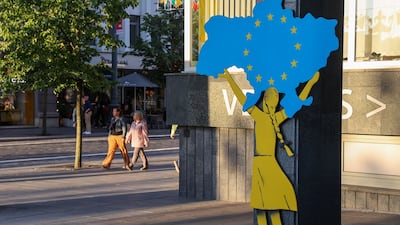President Recep Tayyip Erdogan's presidential palace, the Ak Saray outside Ankara, is as far from Sweden's Lulea airbase as it is possible to stretch in Europe, but on June 19 events in the high north superseded his main Nato gambit.
Since Sweden and Finland submitted a bid to join Nato on May 18, 2022, Mr Erdogan had stood out as a spoiler, openly refusing to send accession documents to parliament for ratification until he had secured concessions from Stockholm.
Diplomatic pressure mounted but the Turkish leader stood firm. Then, last month, the US air force played its trump card.

Two B1-B Lancers, the supersonic bomber built to carry 24 free fall nuclear bombs and now equipped with eight air-launched cruise missiles, landed in Sweden and held a joint exercise with the Swedish Airforce. It was the moment that Sweden's de facto Nato status crystallised.
Elisabeth Braw, a fellow at the American Enterprise Institute, said the exercises showed that Sweden is very much part of the Nato "gang". Arriving at the summit in the Baltic capital Vilnius on Monday, Mr Erdogan used his leverage at last to target Brussels for concessions and a deal was done to move forward accession after all.
For Mike Doran, a long-time and sympathetic Erdogan watcher at the Hudson Institute, the announcement was a classic manoeuvre from the man who has essentially led Turkey since 2002. “This is Erdogan negotiating hard,” he said.
Nato Secretary General Jens Stoltenberg hailed Mr Erdogan's agreement as a major victory, describing the two-day Nato summit as “already historic before it has started”.
“People think it's very mysterious, but it's not very mysterious. It's actually that this is in the interest of Sweden. It's also in the interest of Turkey,” he said.
Speaking on Tuesday, Pal Jonson, the Swedish Minister of Defence, told The National that Sweden stood ready to immediately join Nato's standing forces. “We are ready to support all the allies within the alliance,” he said.
The Turkish President, widely viewed as a master negotiator, kept allies guessing until the last minute. His sudden announcement in Istanbul on Monday linking Turkey's agreement to Sweden becoming a full-fledged Nato ally with Turkey's separate and long-time request to join the EU came as a surprise.
The European Commission was quick to pour cold water on any attempt at linking the two issues, with its deputy chief spokeswoman Dana Spinant telling reporters in Brussels that Nato and EU enlargement were “separate processes”.
“The European Union has a very structured process of enlargement with a very clear set of steps that need to be taken by all candidate countries,” she said.
The commission pointed to its recent recommendations on Turkey.
Its latest report, published in October, highlighted the EU's “serious concerns on the continued deterioration of democracy, the rule of law, fundamental rights and the independence of the judiciary” in Turkey.
Yet Mr Erdogan's negotiations skills seem to have unlocked, at least in writing, concessions from the bloc – as well as from the US.
On arrival in Vilnius, Mr Erdogan met European Council president Charles Michel in between two meetings with Swedish Prime Minister Ulf Kristersson, paving the way for Nato's Secretary General to announce Turkey's acceptance of Swedish membership later in the evening.
The EC invited its foreign affairs chief Josep Borrell and the EU Commission to submit a “report with a view to proceed in a strategic and forward-looking manner,” tweeted Mr Michel after he met the Turkish leader.
Analysts have pointed at possible financial incentives offered by Sweden to Turkey in exchange for Mr Erdogan approving its accession to Nato.
They include Sweden agreeing to support expanding the EU's free-trade arrangement with Turkey.
“With Washington lobbying behind the scenes, I understand that other EU members are open to negotiations,” wrote Turkish analyst Alsi Adintasbas in an op-ed published by the Washington Post.
Some are asking if Mr Erdogan's Turkey is now back in the position with Europe that it occupied in October 2015 when it agreed to stop irregular migration to Europe and take returnees from the Greek islands. That €3 billion package also included assurances on EU membership.
The two sides “welcomed the continuing work on the upgrading of the Customs Union”, a vital point in Monday night's deal. The statement declared that Turkey's accession process, which can be traced back to 1987, would be re-energised.
As a result, analysts are looking to Washington for the most meaningful parts of the breakthrough agreement. Mr Erdogan's “most important ask” remains the purchase of F-16s from the US, added Ms Adinstabas.
This requires a significant change of stance from the US Congress, which was angered by Turkey's decision in 2017 to buy Russian missile defence systems.
But the White House has “made headway over the weekend in convincing congressional leaders” to go ahead with the sale, wrote Ms Adinstabas.
The White House's lobbying efforts were confirmed on Tuesday by White House National Security Advisor Jake Sullivan.
He told journalists in Vilnius that US President Joe Biden would “push ahead on getting F-16s to Turkey, as they have long wanted,” according to senior White House Bloomberg reporter Jennifer Jacobs.
Questioned about the F-16s, Nato Secretary General Jens Stoltenberg said that Nato has been very clear about the need to remove restrictions on arms exports between allies.
“I welcome any dialogue between Turkey and the US on F-16s, but that's not part of the agreement we reached yesterday,” said Mr Stoltenberg.
Mr Sullivan also said that the US had thrown its weight behind Turkey's request for renewed engagement with Brussels.
US lobbying seems to have been crucial in smoothing over rifts between Turkey and its European allies, whether on the Nato front or with the EU.






















